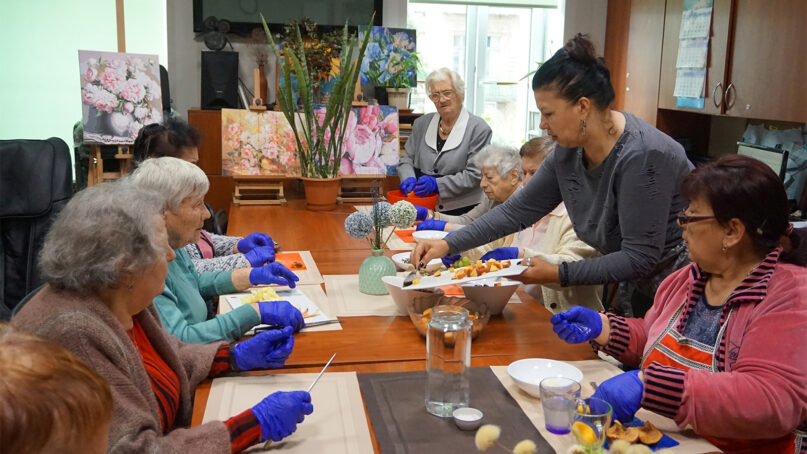(RNS) — As families like mine gather tonight to mark Rosh Hashana, the Jewish New Year, we’re doing so against the backdrop of the ongoing crisis in Ukraine.
The holiday’s poetic image of our names being inscribed into the Book of Life has new resonance this year. With death and destruction abounding in a country very close to my heart, from family roots to a half-dozen trips there in the last decade, I am hyper aware of our mortality, and our promise.
In one of this season’s central prayers, Jews exhort God to “renew our days as of old” — to recharge our batteries, to refuel our reserves and give us the strength to go on despite a world that invites despair more often than dreaming.
But how do we do it? How do we cultivate our resilience when it all seems like too much, when every problem — from geopolitics to climate change to economic strife and beyond — overwhelms us and seems to belittle our individual efforts to make things better?
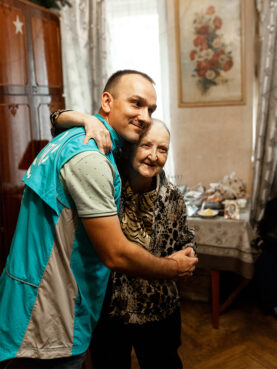
Lidia C., right, hugs a JDC volunteer following a visit. Photo by Yura Malenko
I’m drawing hope and inspiration from people like 82-year-old Lidia C. She is among tens of thousands of everyday Ukrainians with the deck stacked against them who’ve still found ways to give back, even now.
Lidia was a distinguished professor of anatomy at the teacher’s college in Lviv for 27 years, but when the Soviet Union collapsed, she lost everything overnight. She did her best to eke out a living through the lean, turbulent post-Soviet 1990s, and by 1998, struggling to make ends meet, she decided to join her Jewish community’s nascent social safety net as a home health aide.
For 12 years, until her health gave out and she began to require the same assistance herself, Lidia worked tirelessly for her city’s Hesed social service center — feeding, bathing and caring for dozens of her city’s elderly Jews. Named for the Hebrew word for “loving kindness,” the Hesed system was established in 1993 by my organization, the American Jewish Joint Distribution Committee (JDC).
This humanitarian relief network, the backbone of our operation in today’s crisis, currently serves more than 35,000 Jews in Ukraine, more than 20% of the country’s Jewish population. It’s a holistic and life-saving aid effort supported by a multi-faith coalition, including the Claims Conference, Jewish Federations across North America and IFCJ, among others.
So how does Lidia, one of its beneficiaries, put this holy season’s words into action?
“Wait for peace, and continue to do your work,” she instructs.
That stoic approach is one I’ve heard from so many Ukrainian Jews over the last seven months. Keep going, they urge, and find new ways to help, to innovate and brighten your plot in the community garden. No matter what, they say, you have your role to play.
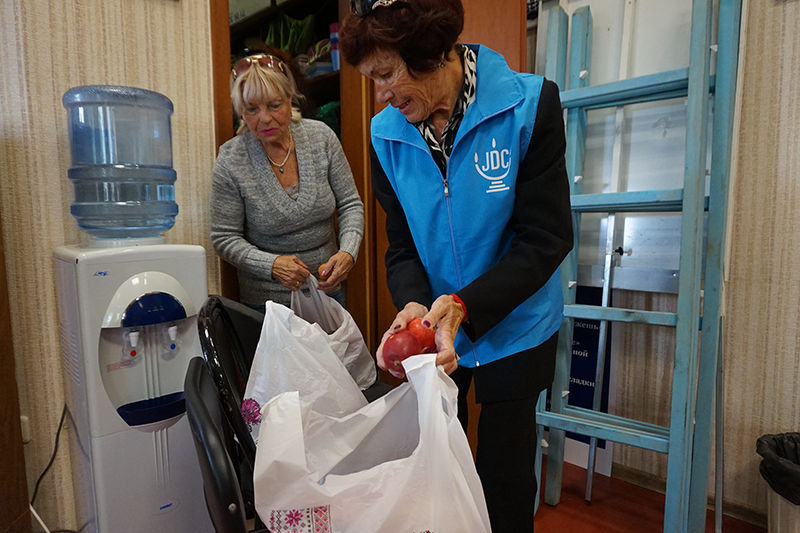
JDC volunteers pack holiday gift boxes for local community members who will participate in virtual Rosh Hashana activities in Odesa, Ukraine. Photo courtesy of JDC
Galina L. is a prime example. Originally from Bakhmut, a small city on the front lines in the eastern part of the country, she and her disabled daughter are now internally displaced, like millions of others throughout Ukraine.
After years of struggling to find work and subsisting on her daughter’s meager state disabilities pension, she became a Hesed homecare worker like Lidia. She gave back to the same Jewish community that provided her family with vital food and medicine when they could not make ends meet.
When shelling and rocket attacks forced them to flee to the relative safety of Dnipro, it was no surprise to 51-year-old Galina that the Jewish community immediately stepped up to support her: “They said, ‘Come to us, and we’ll help you right away.’”
Galina’s reflexive benevolence quickly returned. Without a permanent home and unable to return to Bakhmut — her daughter’s school was bombed in July — Galina threw herself into volunteering, visiting seniors at a Dnipro old-age home and performing Jewish songs at holiday celebrations.
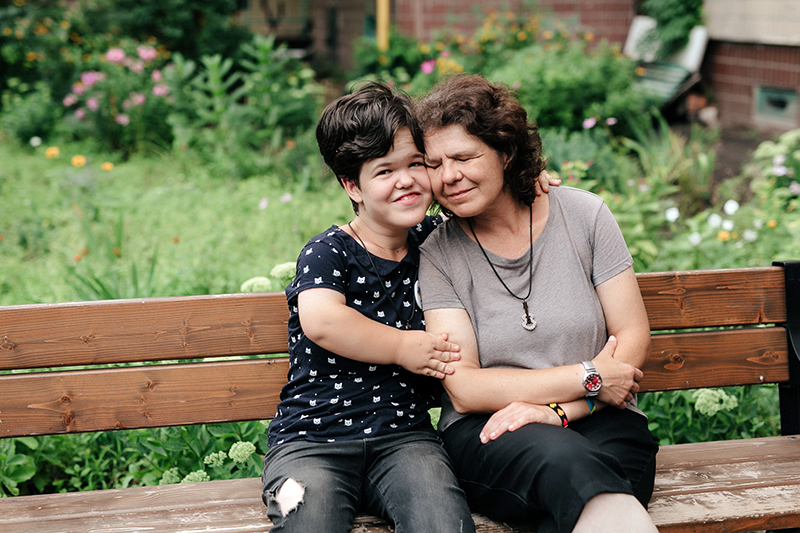
Galina L. and her daughter, originally from Bakhmut, Ukraine, are now internally displaced living in Dnipro. The two volunteer in the community — visiting seniors and performing Jewish songs at holiday celebrations. Photo by Misha Kovalev
“Everyone feels better when they know they’re not alone. You know that your problems are not the worst problems,” she said. “As long as you’re alive, you can still fix things — but when you give up, when you break, that’s when all is lost.”
The same High Holiday prayer that asks God to revive our spirits and renew our energy also implores the Divine not to forsake us and not to cast us away in our hour of need. I’ve come to believe, especially in these dark days, that these two lines in the liturgy are linked in the deepest way — that each is the engine of the other.
It has powerful lessons for each of us, regardless of our background or faith.
First, when we show up for those in need, we are strengthened. We’re reminded that our words and deeds do matter. In the tangible mutual aid we provide each other, we can find the building blocks of that more universal restoration and recovery we yearn for.
Second, by bolstering those at their lowest and most raw, we can count on them “paying it forward” as they can. People in need are also people with talents and skills and a hunger to give back. As we see with Lidia and Galina, they’ll help build communities where generosity, mutual responsibility and continuing care are renewable resources, even at the most tragic of times.
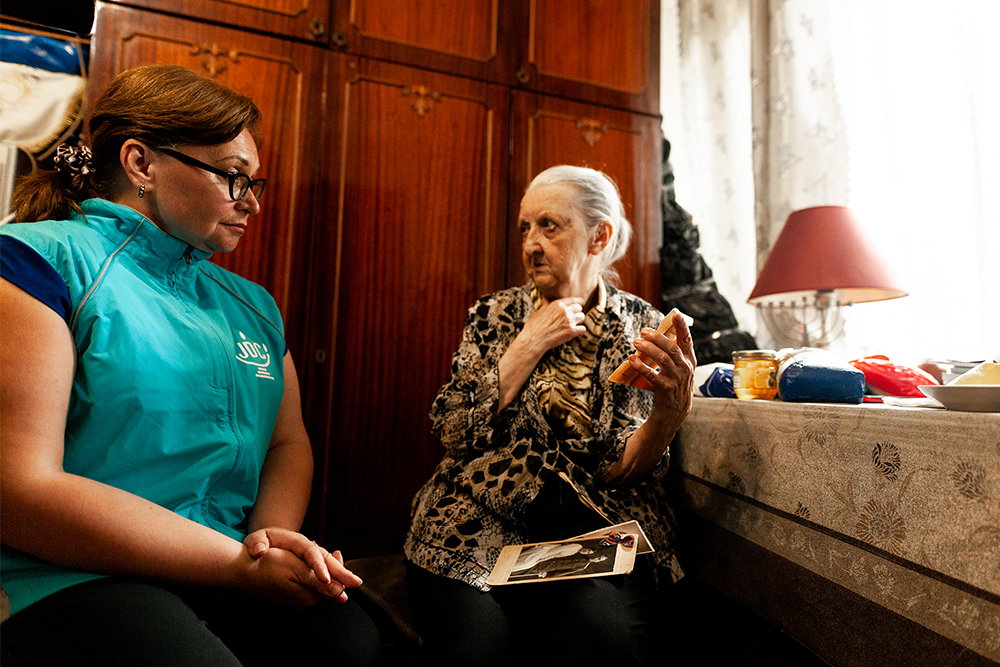
Lidia C., right, an elderly woman from Kharkiv, Ukraine, is one of the more than 35,000 elderly Jews and vulnerable families JDC continues to care for in Ukraine. Photo by Yura Malenko
That’s the definition of a strong community — and in Ukraine, one that is a miracle of history. Across the country, there are resilient, inventive Jews and Jewish institutions impossible to imagine just a generation or two ago before Jews began to cast off decades of Soviet oppression and the Holocaust’s legacy to chart their own future.
Let’s recommit ourselves today to guaranteeing that the most vulnerable are never forgotten. By investing in their future — supporting ongoing relief efforts, aiding refugees or volunteering in our own communities to aid those in need — we’re writing them into the Book of Life with the works of our own hands. We might just find ourselves, and our societies, renewed in the process, too.
Then we’ll all share in the fullness of the traditional Rosh Hashana greeting for a l’shanah tovah u’metukah — a good and sweet year ahead.
(Alex Weisler, a former journalist, is the senior video and digital content producer at JDC, the global Jewish humanitarian organization. The views expressed in this commentary do not necessarily reflect those of Religion News Service.)
